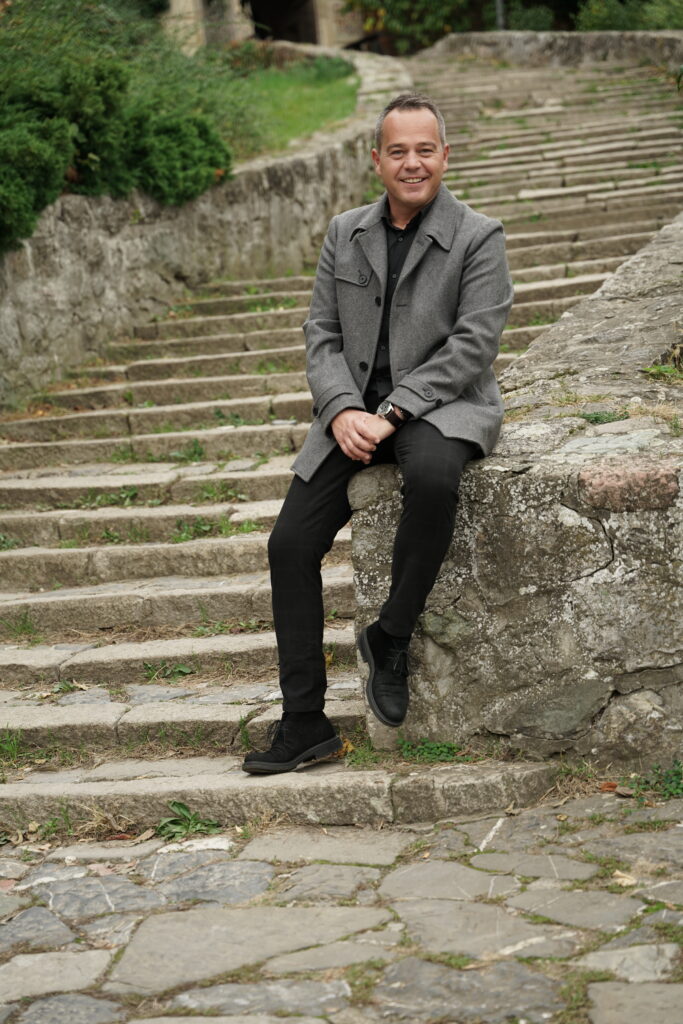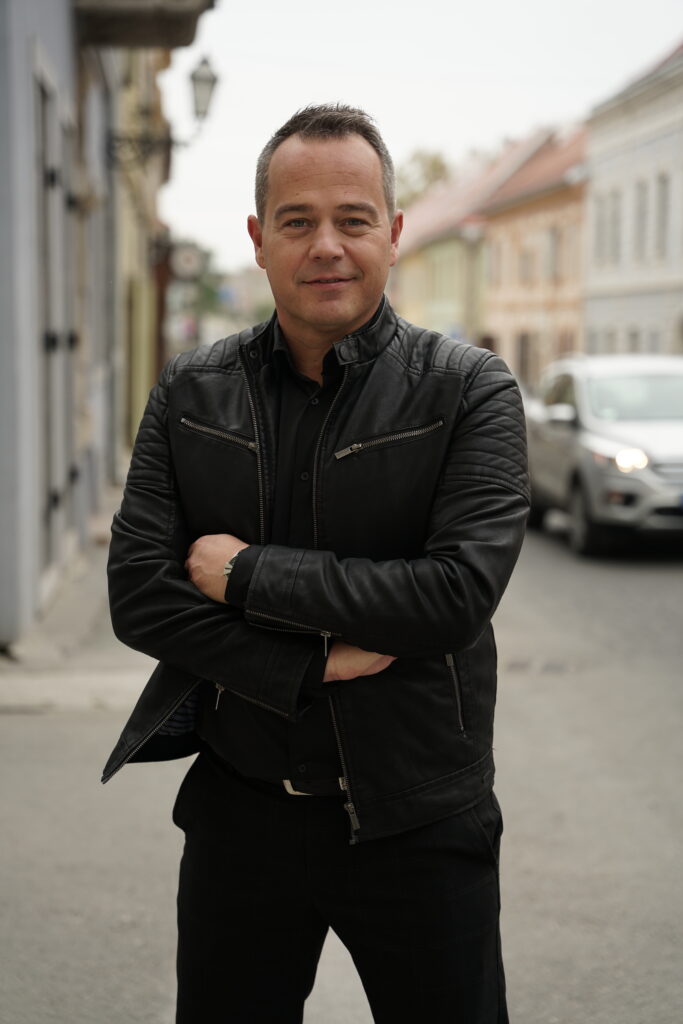A first-hand account of institutional silence, professional resistance and the cost of speaking out in Serbia’s public broadcaster

Interview by: Dragan Nikolić
Milan Srdić, journalist and RTS correspondent from Novi Sad, has become one of the most recognisable voices from within Serbia’s public broadcaster to publicly challenge its editorial silence. In this interview, he speaks openly about internal resistance, the cost of integrity, and why staying at RTS is not an act of loyalty to the institution, but to the idea of what it should still be.
How do you perceive the role of the public broadcaster in the current social context?
The public broadcaster – or rather, the News Division of its programming – is not fulfilling its role as defined by law and the internal rules of RTS. The Dnevnik 2 news bulletin alone has violated these laws multiple times, while the professional code of conduct has been expelled from both Takovska 10 and Aberdareva Street.
As a consequence, we are now witnessing a student blockade and an altered programming schedule. Those in charge at RTS were caught off guard, having failed to take the weight of the current moment seriously. The depersonalised “editorial board” whose statements we read did not expect to find itself in a position where, with the help of gendarmerie and police, employees are being escorted into the building through back entrances and by force, only for the location of programme broadcasting to then be changed – a location most employees know nothing about.
To clarify: one group of RTS employees is currently producing the programme, while the majority are not participating in it. It could therefore be concluded that RTS has been taken over from within – the current programming is not supported by the majority of its own staff.
The minority now making decisions within RTS did not expect to face precisely what they should have prevented at all costs: the disruption of programme production.
So, the reason we are no longer watching RTS, but rather an attempt at a programme, does not lie with the students and citizens blocking buildings in Belgrade – the responsibility lies with them.
And in a historical context – what has changed, and what has remained the same?
It has become evident that negative selection has taken its toll. With a few exceptions, the Dnevnik 2 news bulletin today features journalists with minimal experience, unprepared for the assignments they are given.
From the way they speak, it’s clear that they have little understanding of the political situation, current events, historical context, or even the Serbian language – the very fundamentals that RTS once upheld.
Today, these individuals represent the face of the public broadcaster, alongside all RTS journalists, because those with knowledge, experience and credibility have either not been allowed to do their jobs – or have chosen not to come to work under the current conditions.
RTS is not theirs – it’s mine. So why should I be the one to leave?
Both the government and the opposition criticise the public broadcaster. There is, admittedly, a mild form of protest among employees, yet nothing seems to change. Are you optimistic that change is possible?
I wouldn’t describe the protest within RTS as “mild” – that’s not the right word. First I spoke out, then the entire Novi Sad correspondent office, followed soon after by workers in RTS Production, then many other editorial teams, nearly all the unions, and our colleagues from the Naš protest initiative, as well as from other bureaus. We’ve all been raising our voices for a long time – and this is not a small number of people.
Some are dealing with these issues within the institution, out of the public eye, in different ways. All of us are on the front line, and the public should know that – and I believe they have come to understand that over the past few months, following everything that’s happened to RTS journalists.
As for change – unfortunately, that remains largely a political question. Both government and opposition treat journalists in much the same way, and not only those at RTS. The style of communication is unacceptable, and I am convinced that both the current and previous governments – as well as today’s opposition – know very well how RTS fits into the political power-sharing game after elections.
Most of them have taken part in it at one point or another, and none has shown a genuine intention to make RTS a free and independent medium. That would not suit anyone in power, because its influence is enormous.
Change will come only when RTS is clearly separated from what are often referred to as the political elites.

Your public statement on the student protests and the response of your home institution, RTS, sparked strong reactions in society. What would you highlight as your main impression?
My impression is that the public cares deeply about how their public broadcaster reports. Not only because we all pay for it, but because it should be a symbol of normality in Serbia – a reflection of our society.
What hurts the public the most is that the mirror RTS is supposed to be has become fogged over. It no longer reflects Serbia – it reflects the shadow of a few vested interest groups.
Has your public stand changed you as a journalist? How has it affected your career?
It hasn’t changed me. I’ve been in this profession for over 30 years, with a great deal of experience behind me, and numerous awards and recognitions from both leading domestic and international institutions.
Alongside my practical work, I’ve also been deeply engaged in media theory and have spent decades expanding my knowledge through collaborations with various institutions. I’m the author of several documentary films, two handbooks on journalistic reporting, and I’ve hosted many programmes and live broadcasts, including coverage of extraordinary events.
I’ve edited some of the best radio and television newsrooms – and I’m referring here to those before RTS. I’ve been at RTS for 16 years now, and I’m proud of everything I’ve done.
Everyone read in the media that immediately after the tragedy at the railway station, I was not allowed to report live. That remains the case today.
Six months without appearing in the programme is a serious blow to any television journalist’s career – but I don’t believe they’ve managed to tarnish it. This isn’t the first time I’ve been “removed” at RTS – it’s happened more than once.
Many people ask me why I’m still here, when I could choose to work elsewhere. And my answer is always the same: RTS is not theirs – it’s mine. So why should I be the one to leave? Let those who don’t love it the way I do be the ones to go.
What hurts the public most is that the mirror RTS is meant to be no longer reflects Serbia, but the shadow of a few interest groups
As a long-time correspondent, you have witnessed various social changes. What would you highlight as a key moment in the transformation of the public’s relationship with the media?
There have been many. But just as the internet has, over the years, had the greatest impact on how people relate to the media, this current student and civic protest may actually be the most powerful social moment because of it.
We all saw how quickly photos, names, and membership cards of those who attacked students surfaced – as well as covert footage of politicians giving instructions to the attackers. That kind of material couldn’t be ignored, even by television broadcasters.
Today, the public expects much more from traditional media because of the internet. They want deeper explanations, more context.
As much as this is a positive development, it also has a downside – the internet is a fertile ground for spreading false information and for spinning partial truths.
There is much debate about the (lack of) media freedom in Serbia. What does that (lack of) freedom look like from the inside, in everyday fieldwork?
In my case, it hasn’t existed. I’ve already explained how things have worked in my previous answers. There were instances when some of my reports weren’t aired, and I only found out during the live broadcast – but those were truly rare situations.
I always asked for explanations and addressed such matters internally. As a regional bureau, in the eight years we’ve existed, we’ve covered all the most important topics in the city – and we’ve initiated many of them ourselves.
Anyone who follows RTS regularly knows this well. All the stories from Novi Sad that some may consider controversial were aired on RTS – sometimes in Dnevnik 2, though more often in This is Serbia and other programmes, even under editors who now follow a different editorial course.
Although I have supported the students’ demands from the very beginning, and stand behind their protests and efforts to highlight what is wrong in this society – to remind the citizens of Serbia that we are, in fact, a society full of solidarity and empathy – I cannot support the use of wanted posters with photos of my colleagues, nor the idea that RTS should be shut down.
I am certain these were rash decisions, because they run completely counter to the spirit the students have brought into this society.
What is needed for the situation in the media to change?
In short, exactly what the students are demanding – for institutions to do their job.